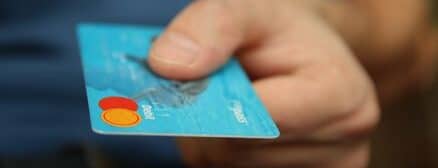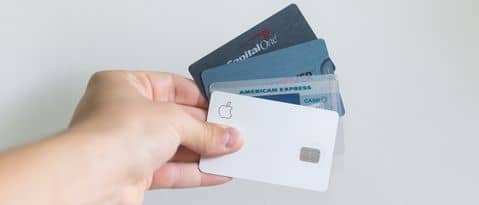Building Credit History From Scratch: 5 Ways To Get Started
It’s a common catch-22. You need credit to get a credit score. But to get credit, you often need a good credit score.
How do you go about building credit history when you’re caught in this conundrum?
Luckily, there are tips, tricks, and products that can help you get started. Find out more below.
What Is Credit History?
Credit history is exactly what it sounds like. It’s the history of how you have used and managed debt and other financial accounts.
Your credit history shows up as data on your credit reports. The three main credit bureaus—the entities that keep credit files and report on your credit history to lenders—are Experian, Equifax, and TransUnion.
Your credit history, as it appears with each of those organizations isn’t always the same. That’s because credit history is created when lenders and others report information about your accounts to the credit bureaus. And there’s no requirement that all lenders have to report to every bureau—or even to any bureau.
If you’re starting to see that credit history can be a bit tricky, you’re not wrong.
How Is Credit Score Tied To Credit History?

Your credit score is a three-digit number that reflects your overall creditworthiness. Scores range from 300 to 850, and higher is always better.
Credit scores are calculated based on credit scoring models, which apply algorithms to the information in your credit report to come up with a score.
Multiple scoring models exist. They also only take into account the information present in the credit bureau file being used. Even if someone is using the same credit scoring model and algorithms, the exact score based on your Equifax report might be different from a score based on your TransUnion report.
If you have enough credit, you can have dozens of different scores.
Why Do Credit History And Credit Scores Matter?

It takes a little work and time to educate yourself to understand the basics of credit history and credit scores, but it’s well worth the effort because your credit history has a pretty big impact on your life. Here are just some of the reasons these things matter:
- Better credit means access to more loans. A higher credit score—and more positive credit history—helps lenders know you’re someone who generally pays back debts on time and as agreed. That makes you a less risky borrower, which means more lenders are willing to offer you credit. They’re also typically willing to offer you more credit at a lower cost—aka interest rate.
- Good credit helps you score rewards. The same factors are at play when it comes to credit cards and other accounts that can come with potential rewards. Rewards credit cards, such as those that offer you airline miles or hotel points for every dollar you spend, cost money to manage. Lenders are more willing to approve someone for such cards if they’ve demonstrated a strong credit history in the past—in part because those types of cardholders are less likely to leave the credit card company holding the bag for a balance.
- Insurers, employers, and landlords might check your credit. Credit scores and histories impact more than just what you can borrow. Auto insurers often use credit histories as a factor in weighing whether you’d be a risky policyholder. Bad credit can mean being passed over by the insurance company of your choice or having to pay higher premiums. Landlords often check credit before renting to someone, and even employers may include a review of your credit score in a background check.
How To Build Credit With No Credit History
Now that you know how important a positive credit history can be, you may be eager to build one. Here are five ways to build credit from scratch.
1. Get Added As An Authorized User On Someone’s Credit Card Account
You can be on someone else’s good credit for a while to build some of your own. In many cases, credit card companies report payment history to the credit reports of all authorized users on the account—not just the account owner.
To do this, you need a friend or family member who has an existing credit card account. They should be someone you trust to manage their account well. If they pay their account on time, you can get the benefit of positive payment history on your own credit file. But if they pay late, you get the ding too.
This tip only works if the credit card company in question does report to the files of authorized users, though. You can have your loved one call the customer service line for their card to ask before adding you as an authorized user if you like.
Here are some other important things to consider and know before taking this step:
- The credit card company might send a card for the account in your name. You don’t have to use it or ever have possession of it to get credit-reporting benefits. Make sure to discuss with your friend or family member the role you’ll play on their account and let them know you don’t need and aren’t asking to actually use their account to make purchases.
- A high credit utilization rate can be bad for your credit score. You may not want to become an authorized user for someone who regularly runs up their credit card balances and doesn’t pay them off.
- Weigh the importance and state of your relationship before asking someone for this type of assistance. This works best when you have a strong relationship with plenty of communication and trust.
2. Ask Someone To Be A Cosigner On A Loan

If you need a loan—especially for something like a car—but you don’t have the required credit history, you can also use someone else’s credit. In this scenario, you apply for a loan with a cosigner, who agrees to pay the debt should you default on the loan.
Since the cosigner is saying they’ll ultimately be responsible for the loan, the lender tends to look at their creditworthiness instead of yours. But once you get the loan and start making payments, the positive payment history is recorded on both your credit reports.
To take this step toward building credit, you obviously need someone willing to cosign, which isn’t a task to be taken lightly. The cosigner takes a big risk because if you don’t pay the loan, they have to either pay it or take a big hit on their own credit.
The best possible scenario occurs when you work with a lender who reports to all three credit reports for both you and the cosigner. That way, you can build credit history across all bureaus while paying back the loan.
Here are a few tips for ensuring you get positive credit history from this process—and protect your personal relationship with the cosigner:
- Don’t take a loan you can’t afford. Be honest with yourself—and your cosigner—about what you can afford. If the monthly payment on a loan is too much of a stretch, do you really want to promise the lender and your cosigner that it’s no problem? Taking the time to construct a monthly budget and understand how much you can spend saves, everyone, a lot of headaches down the road.
- Make it a priority to pay on time. Be serious about paying the loan on time. If you miss the payment, even by accident, your co-signer’s credit might suffer. Plus, you affect your goal of building a positive credit history. You might want to let your cosigner know you’re willing to set up auto payments to help keep that from happening.
- Keep your cosigner in the loop. Don’t ghost your cosigner after leveraging their credit. Stay in touch and let them know as soon as possible if you have an issue and what you’re doing to make it right.
3. Apply For A Credit-Building Loan
Credit-building loans aren’t typically loans you take out because you need the money right now. They’re loans solely for the purpose of building your credit history. While each has its own rules and processes, they generally work as follows:
- You secure the loan with a deposit into a locked savings account. If you deposit $1,000, the loan amount is $1,000.
- You pay the loan off over time as agreed. That can mean weekly, biweekly or monthly payments, depending on the details of the loan.
- The lender reports timely payments to one or more of the credit bureaus. Look for lenders that report to all three to get the most out of this process.
- Once you pay back the loan, the savings account is unlocked and you get access to that money.
- If you don’t pay back the loan as agreed, the lender uses the money in the savings account to make good on your debt.
You do usually pay a fee for this type of loan, which is one way the lender makes money.
4. Apply For A Secured Credit Card

A secured credit card is similar to a credit-building loan in that you have to put up some money upfront. You make a deposit with the credit card company that backs your initial credit limit. Many secured credit cards allow deposits starting between $200 and $300.
You use the credit card as you would any other credit card, making at least the minimum payments on time every month. Since your balance likely won’t be high to begin with, it’s a good idea to plan to pay it all off each month so you can use it again the next month.
If you manage your account well for around six months, these companies may offer you a higher credit limit and, potentially, a better rate. They typically credit your deposit back after a period of on-time payments too.
5. Get Credit For Paying Other Types Of Bills On Time
Finally, you can get credit for paying some of the bills you already pay. Utility, cell phone, and car insurance companies don’t usually report to the credit bureaus when you pay on time. The same is true for most landlords.
But you can invest in services that report these payments for you, creating new trade lines on your credit report. That lets you build a positive payment history even if you don’t have a loan or credit card yet.
Building a credit history when you don’t have any credit can take time. But it’s not impossible, and there are plenty of paths you can take to do so.






